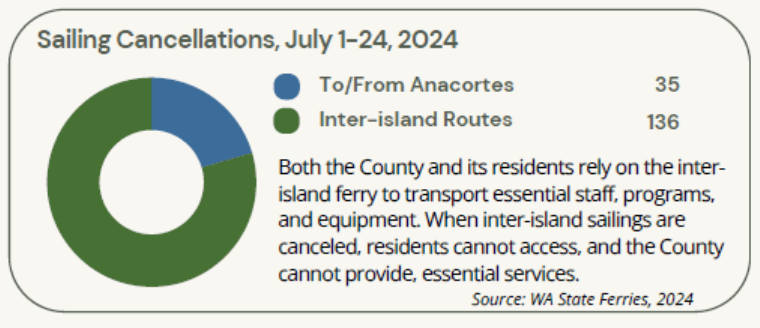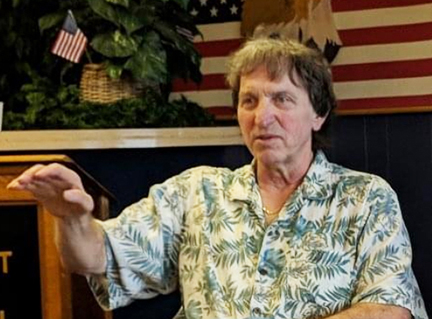By banding together Saturday, WSF-served communities may have more clout in Olympia
Tuesday, November 19, 2024
by Jeff Noedel
SanJuans.Today was the ONLY news media in all of Washington to cover the important 2024 Fix Our Ferries legislative summit. Not only did we report on the meeting, but we live-streamed the entire public session and recorded it for the record.
If you value this kind of commitment to news the San Juans care about, please make a tax-deductible donation now. And thanks to the Mary See Foundation, if you donate, they will match any donation you make up to $10,000!
To donate and have your donation matched, click here.
- The need for new, incremental tax revenue to run Washington State Ferries
- A serious investigation of the idea of building a 21st Century “Mosquito Fleet” – smaller boats, decentralized routes possibly stopping at many more docks
- A claim by a leader of the Masters, Mates & Pilots union that they’ve had more success in recruiting than the public knows
- New ways to present WSF performance data that make the data feel more in synch with customers’ lived experiences
These were just some of the Big Picture discussions and out-of-the-box ideas that were discussed among a novel collection of leaders on Saturday in Mukilteo.
While Washington State Ferry service has been in decline in recent years, some routes have suffered more than others. And none have suffered more than the San Juans routes.
But the geographic distances between the routes — and the varying degrees of impact between the routes — always led to a siloing of the different routes. Most all towns and cities with a WSF terminal have an official WSF ferry advisory committee (FAC). And several of the ferry-served communities benefit from deep support from their state legislative delegations (one senator and two representatives per district).
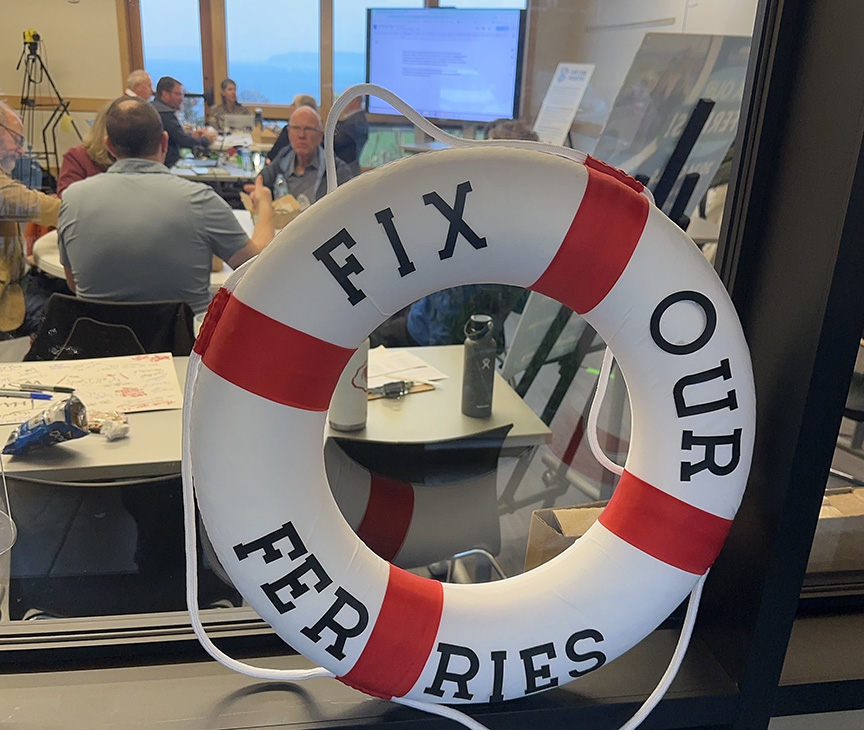
Until Saturday, it was largely “every ferry-served community for itself.”
On Saturday, six people from the San Juans made their way to the Rosehill Community Center in Mukilteo, WA to participate in the first meeting of the “Fix Our Ferries” 2024 Legislative Summit. Approximately 30 people in total participated, including delegations from Vashon Island and Bremerton.
Fix Our Ferries is the name of a new coalition of ferry activists, FAC members, and County Council Reps and Commissioners. It was organized by Vashon Island’s Islanders for Ferry Action (IFA), which is an offshoot of the Vashon Chamber of Commerce. Organizing work was led by Amy Drayer, who runs IFA. She is a consultant paid to work 20 hours a week for IFA.
The meeting was instantly relevant because it also included four state legislators deeply invested in WSF issues, as well as a senior manager with WSF. Because important leaders from the legislature and WSF participated in the first half of the meeting, there was an air of cooperation and mutual respect which seemed to create a strong foundation between the Fix Our Ferries and the lawmakers. If so, this new relationship could be productive in the upcoming biennial session of the Washington State Legislature, which begins in January.
The four state legislators who participated in the Saturday summit were State Senator Marko Llias (D-21), State Representative Emily Alvarado (D-34), State Rep. Clyde Shavers (D-10), and State Rep. Greg Nance (D-23).
Senator Llias is Chairperson of the Senate Transportation Committee, making him one of the five most powerful people in Washington when it comes to Washington State Ferries. The other key leaders on WSF policy are the Governor, the Chairperson of the House Transportation Committee, the State Secretary of Transportation, and the Assistant Secretary and Executive Director of Washington State Ferries.
Representing WSF at the summit was John Vezina, WSF’s Senior Director, External Relations.
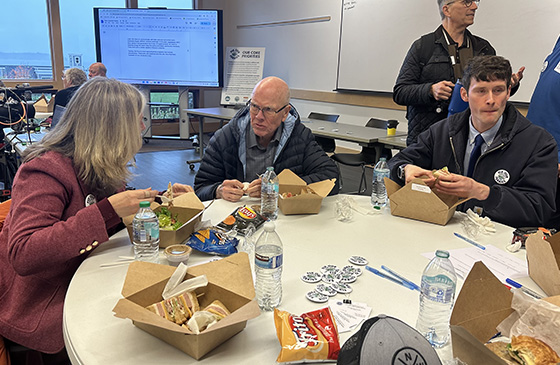
The San Juan delegation was made up of
- Tom Starr, chairman of Ferry Lovers of Washington (FLOW)
- Jane Fuller, San Juan County Council Rep (District 3) and Council Chairperson
- Justin Paulsen, San Juan County Council Rep-elect (District 20) and San Juan County FAC Chair
- Denice Kulseth, Administrator, Town of Friday Harbor
- Ken Burtness, San Juan County FAC member; and
- Carey Eskridge, Executive Director of the Orcas Island Chamber of Commerce.
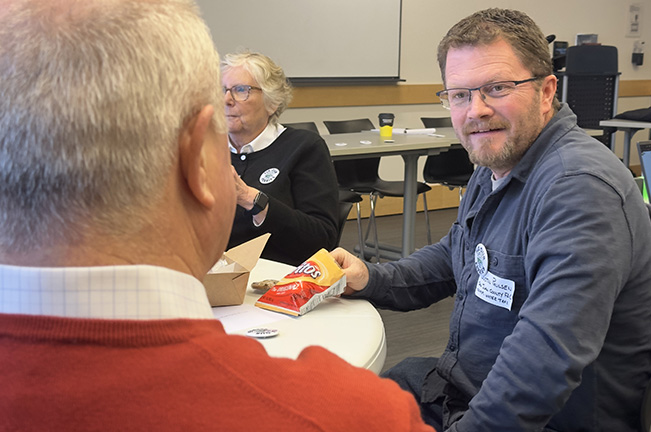
Other leaders from the region in attendance included
- Janet St. Clair, Commissioner, Island County
- Daniel Twohig, Vice President, United Inland Group, Maritime Division, International Organization of Masters, Mates, and Pilots (MM&P)
- Dean Enell, Chair, Clinton Ferry Advisory Committee
- Cody Bakken, Member, Clinton Ferry Advisory Committee
While activists and leaders from the San Juans, Vashon, and Bremerton all arrived with energy and appetite for change, the professionalism and diplomacy that characterized the meeting was commended early on by Senator Llias, who said, “My mom always reminded me that honey attracts more than vinegar.”

Representative Emily Alvarado opened the panel discussion by stating ferry solutions in 2025 will depend on creating new revenue for the state. She said, “What I’m focused on is that we are going to need to come together and have the community really aligned around a vision of…identify a new revenue to bring in so that we can invest in the critical services that our communities need.”
After boasting that his hometown Mulkilteo WSF ferry terminal is the finest terminal in the system,” Senator Llias built on Alvarado’s belief that new revenue is needed. He said, “We face tremendous pressure to sustain these investments and absent new resources, there is not sustainable funding to continue the crewing investments we’ve made and the vision that we’re trying to achieve and very so I transportation in this next two-year budget, our current projection is something on the order of a $200 million deficit in the next biennium, which would be the 2027-2029 biennium, over $1 billion deficit projected in the transportation budget, because costs have gone up on mostly on our projects, but just costs in general have gone up in this economy.”
Liias continued, “Our largest revenue source is the gas tax, which is declining, as thankfully we’re driving more efficient vehicles and electric vehicles. It does mean that our revenue source is now beginning to go down. So we have a structural problem, right? As we’re beginning to see, like the tiniest green sprouts of progress, we can point just in three years to say: look what happens when we invest deeply in our workforce. Look what happens when we crew above Coast Guard minimums. Look what happens when we buy new service planners and by program, delivery folks in WSF that can deliver these new initiatives for us. We can see that this is working. We just don’t have a sustainable funding to continue it. So we’re going to Emily Alvarado talked about going to have to talk about more revenue, which means taxes.”
Senator Llias congratulated the ferry activists in the room for two things. First, he said the vocal opposition from ferry-served communities to Initiative 2117 (repeal of the Climate Commitment Act) made a difference in its defeat. Second, he said ferry activism including Vashon’s IFA and the San Juans’ FLOW was noticed by Governor-elect Bob Ferguson.
“You all you all are having impact already. You know, governor-elect Ferguson did not make this a plank in his campaign for fun. He did it because it’s an issue that’s on the agenda that the media is talking about, that you are talking about,” said Llias.
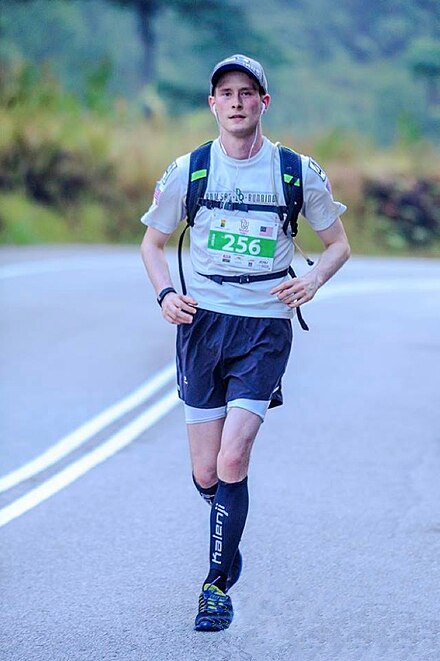
The conversation pivoted when it was Representative Greg Nance‘s turn to speak. As legislators go, he is relatively young and a ball of energy. A graduate of Bainbridge High School and the University of Chicago, Nance, age 36, was a tech entrepreneur and a local nonprofit leader before he was appointed in September 2023 to fill the vacant House of Representatives seat in the 23rd legislative district. Kitsap County voters elected Nance on November 5 with a 66 percent majority.
While statistics show WSF’s high-volume Bainbridge-Seattle route is in the best shape of all routes, with the biggest boats and the best on-time performance and lowest cancellations, Nance has many other constituents who rely on both the Bremerton-Seattle and Kingston-Edmonds routes. And several of Nance’s constituents from Bremerton were present at the summit.
Said Nance, “We’ve got to do more to alleviate the pain that our neighbors are feeling. And that’s really what I view as a core role in the legislature. And so thinking outside the box for how do we get solutions on the water? I’m really excited to hear from Peter Phillips this afternoon, where we think more broadly than our auto ferry network.”
Nance continued, “I can speak firsthand in Kitsap just how important our fast ferries have been to help our families and Kingston and Bremerton communities get to work, get to the dock for get to studies, get to the airport. That is vital. It’s been an enormous supplement to help us ease the pain that we’re experiencing in Kitsap. And my belief is that everyone across the state should have that relief. We can’t wait five plus years for new boats to roll off the line. We need action sooner. And so, I think a mosquito fleet reauthorization in 2025, can be dollars very well spent. And as I speak to leaders in our community, this is one way that we can think outside the box and accelerate.”
Many angles of the WSF crisis were explored on Saturday. Fast, smaller foot ferries got a lot of attention.
San Juan County’s FLOW leader Tom Starr later told SanJuans.Today, “My take home impression is that we are on the verge of a ‘Passenger ferry revolution. All the talk about the ‘mosquito fleet’ was fascinating. Much cheaper boats landing at most any dock. Much simpler crew. Getting an interlocal agreement with Anacortes and perhaps Sidney (British Columbia).”
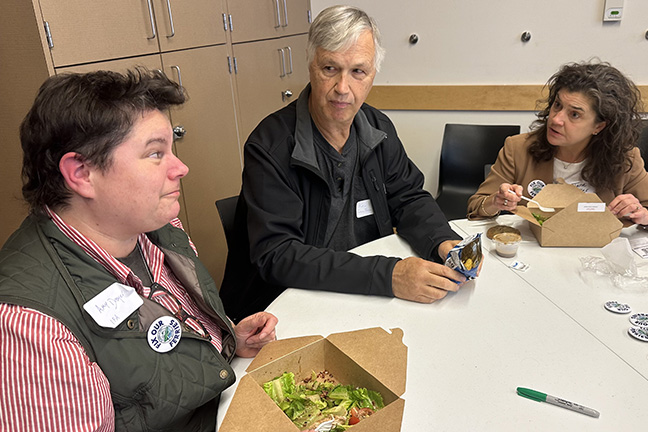
The year 2024 may be remembered as the peak of canceled sailings due to crewing shortages. WSF relies on workers from three major unions. One union, the Masters, Mates & Pilots (MM&P) sent a vice president to Fix Our Ferries summit. Daniel Twohig enthusiastically announced significant recruiting success for new masters, mates, and pilots. The MM&P union worked with WSF to design a program of recruiting and accelerated training.
Said Twohig, “I can sit here right now and tell you that I have got 24 people right now sitting on the bank waiting for a job. (APPLAUSE) There are 14 more who just started their final training. the other day. There will be another dozen in January that will go through the final piece of the training. And the MMP has fixed our problem. We’re done. Now we have to figure out how to keep it rolling at a pace that we can make sure that now that we’ve filled this bench and people are waiting for jobs, we’re going to start seeing the retirements again.”
State Representative Clyde Shavers from Whidbey is also focused on WSF workforce.
Shavers said, “I’m looking I’m focusing this coming session on workforce. I’m the vice chair for the House Education Committee… so anything in kindergarten through 12th grade. We are focusing on how do we ensure that we can develop a new generation of really excited young people to serve in the maritime industry, to serve in the ferry workforce?
Making Public-facing Real-time Data more User Friendly
Several times in the two-hour session, legislators and WSF’s Vezina heard about the need for better communications.
Wendy Aman, a ferry activist from Vashon, summed up the frustration customers have with the need for greater quality and transparency in WSF communications. She said, “Let’s get numbers that mean something, mean something to you as legislators and means something to us as riders. And so in working maybe with John (Vezina), maybe a committee of some sort that involves that is a part of these stakeholders here and Washington State Ferries and the legislators to come up with some of these solutions that can make our lives and are very difficult right now a little bit better while we go through all the processes.”
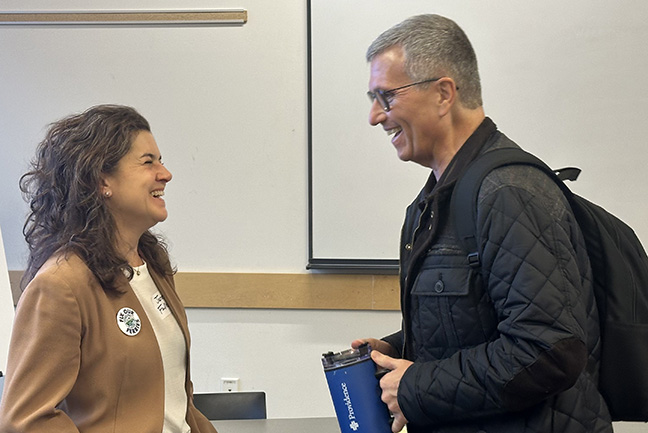
What difference will this make for the San Juans?
Jane Fuller, “The summit absolutely met my expectations and more actually. It was a rich exchange of information, knowledge and experience among diverse stakeholders, all of whom are dedicated to improving marine transportation across the Sound. The insights and perspectives from the four State legislators in attendance were very valuable and meaningful as we move forward in our advocacy to the State for more funding for marine transportation in the next legislative session.”
Fuller continued, “The most important thing to come out of that meeting was the building of relationships to fuel the advocacy work of the ‘Fix our Ferries’ as we move into the legislative session in January of 2025. A lot of ideas and experiences were shared about how to do this in our respective ferry-served jurisdictions. I was delighted to see San Juan County represented by six individuals. We all left the meeting feeling energized to work together as strong advocates for our County.”
Amy Drayer, organizer of the Saturday event was pleased and encouraged. Later she told SanJuans.Today, “Our communities are struggling, so we were so pleased to bring together so many stakeholders to support the work to fix our ferries. When we work together, we significantly improve our chances of securing the investment needed to address our ongoing ferry crisis.”



